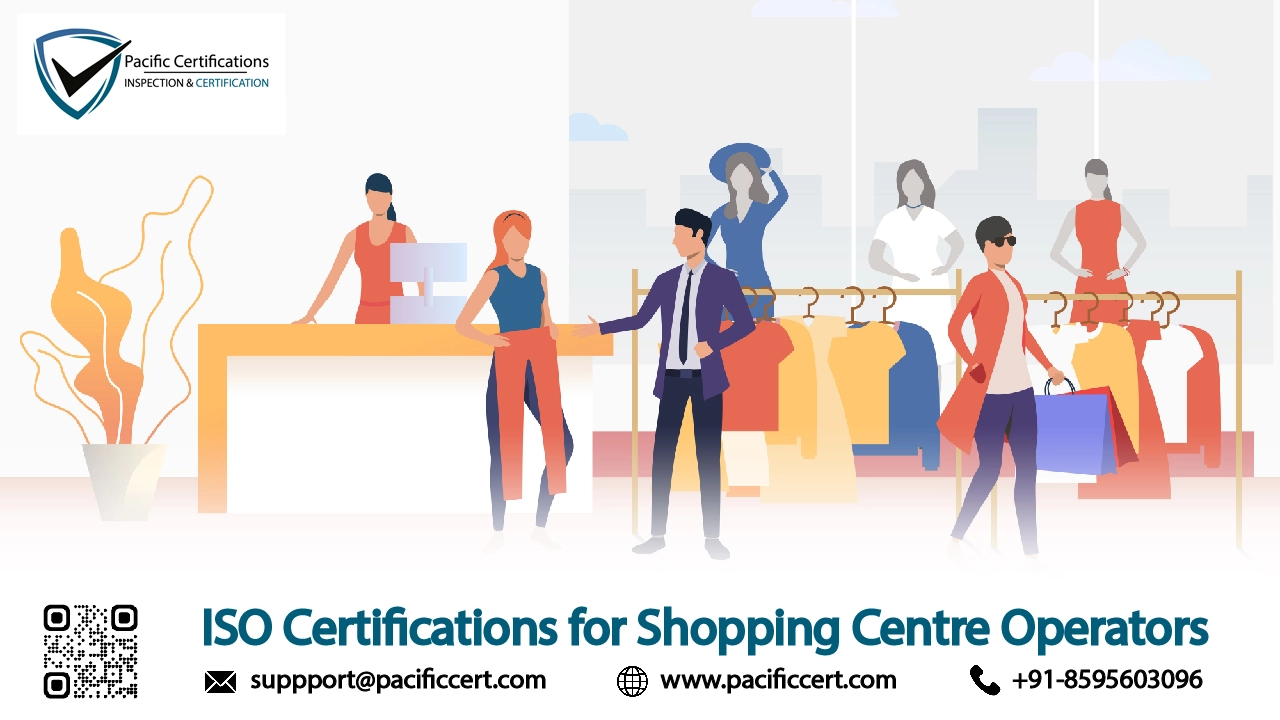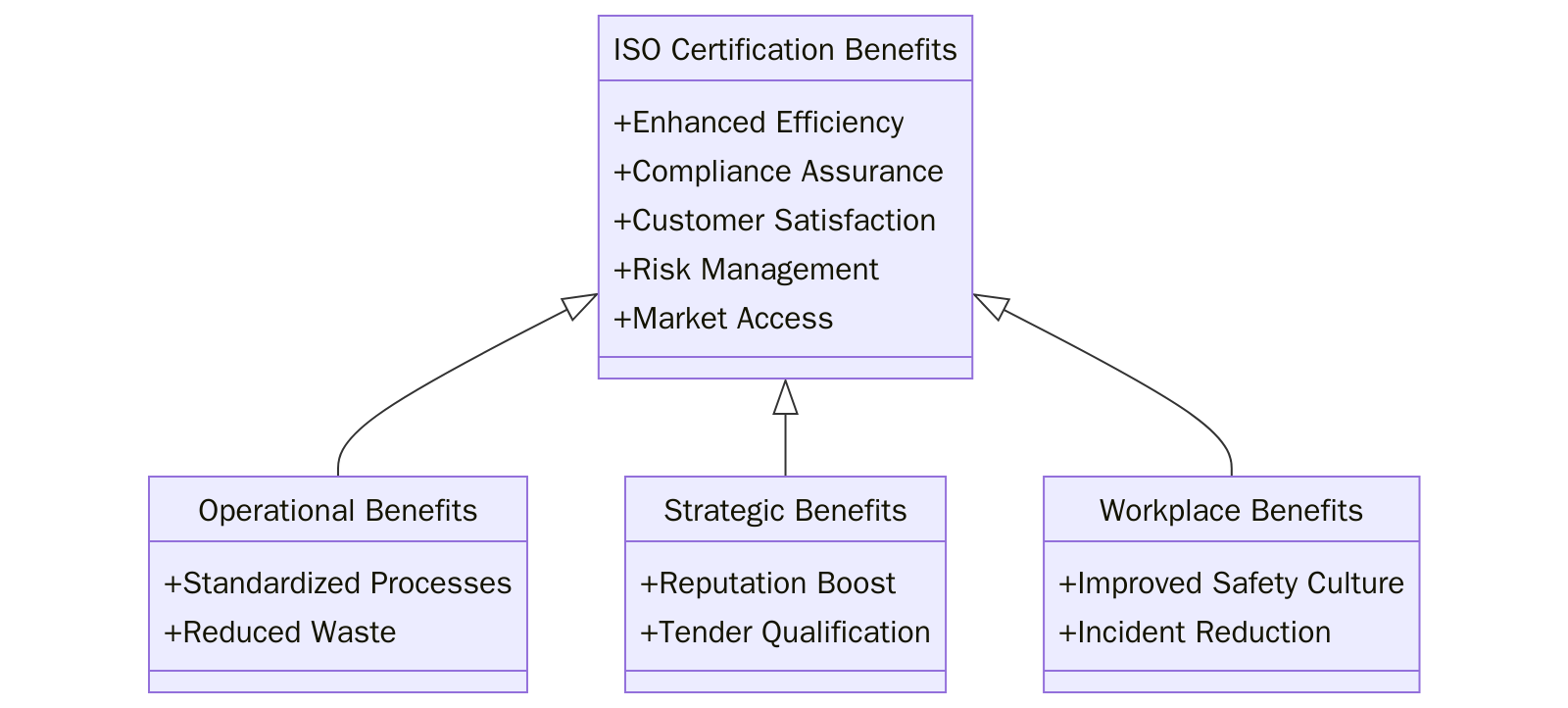ISO Certifications for Shopping Centre Operators Businesses, Requirements and Benefits

Shopping centres are multifaceted companies requiring levels of efficiency, customer satisfaction & legal compliance. With rising customer expectations, sustainability concerns and security risks, moving forward is crucial to international standards.
ISO certifications provide a structure that shopping centre operators can use to improve their quality and overall management. These standards provide operator’s structure to create efficiency, management system and improve aspects of shopping centre’s customer experience and operations.
Request a Quote: Email support@pacificcert.com for a customized certification proposal tailored to your shopping centre’s needs.
Applicable ISO Standards for Shopping Centre Operators
Several ISO standards are relevant to shopping centre operations. These cover various aspects such as quality management, environmental responsibility, occupational health and safety, energy management, and information security:

ISO 9001: Quality Management System (QMS):
ISO 9001 ensures that shopping centres implement a robust quality management system. This certification helps in maintaining service excellence, improving customer satisfaction, and standardizing processes across multiple locations. It focuses on continuous improvement and risk-based thinking to enhance operational efficiency.
ISO 14001: Environmental Management System (EMS):
With increasing environmental regulations and customer awareness, shopping centres must minimize their ecological impact. ISO 14001 certification helps operators implement effective environmental management strategies, including waste reduction, energy efficiency, and sustainable resource utilization.
ISO 45001: Occupational Health & Safety Management System (OHSMS):
Shopping centres must ensure the safety of employees, tenants, and visitors. ISO 45001 certification provides a framework to identify workplace hazards, implement risk mitigation strategies, and comply with health and safety regulations. It helps reduce workplace accidents and improve overall well-being.
ISO 50001: Energy Management System (EnMS):
Energy efficiency is a key concern for shopping centre operators due to high energy consumption in lighting, air conditioning, and security systems. ISO 50001 certification enables organizations to establish energy-saving strategies, optimize usage, and lower operational costs while reducing their carbon footprint.
ISO 27001: Information Security Management System (ISMS):
With digital transactions and customer data storage, shopping centres must prioritize cybersecurity. ISO 27001 certification helps protect sensitive information from breaches, cyberattacks, and data leaks. It establishes strong security policies, risk management, and compliance with data protection regulations.
ISO 22301: Business Continuity Management System (BCMS):
Shopping centres face various risks, including natural disasters, cyber threats, and operational disruptions. ISO 22301 ensures business continuity by preparing organizations to respond effectively to crises, minimize downtime, and maintain operations during unforeseen events.
Click here to find out more applicable standards to your industry
Requirements of ISO Certifications for Shopping Centre Operators
Each ISO standard has specific requirements that shopping centre operators must meet to obtain certification. Below is a brief overview of the key requirements for each applicable ISO standard:

ISO 9001: Quality Management System (QMS) Requirements
- Establish a quality policy and objectives.
- Implement a risk-based approach to process management.
- Ensure customer satisfaction through continuous improvement.
- Conduct internal audits and management reviews.
- Maintain documented procedures and records.
ISO 14001: Environmental Management System (EMS) Requirements
- Identify and assess environmental aspects and impacts.
- Develop and implement an environmental policy.
- Ensure compliance with environmental regulations.
- Set objectives for reducing waste, emissions, and energy use.
- Conduct regular environmental audits and reviews.
ISO 45001: Occupational Health & Safety Management System (OHSMS) Requirements
- Establish policies to protect employees, tenants, and visitors.
- Identify hazards and assess occupational health and safety risks.
- Implement controls to minimize workplace accidents.
- Ensure employee participation in health and safety measures.
- Monitor and improve safety performance through audits.
ISO 50001: Energy Management System (EMS) Requirements
- Develop an energy policy and management plan.
- Identify and analyse energy consumption patterns.
- Set targets for energy efficiency improvement.
- Implement energy-saving measures and monitor progress.
- Conduct regular energy performance audits.
ISO 27001: Information Security Management System (ISMS) Requirements
- Identify and assess information security risks.
- Implement security controls to protect data.
- Develop an incident response and disaster recovery plan.
- Ensure compliance with data protection regulations.
- Conduct regular security audits and employee training.
ISO 22301: Business Continuity Management System (BCMS) Requirements
- Conduct a business impact analysis to identify risks.
- Develop a business continuity plan (BCP).
- Implement measures to ensure operational resilience.
- Test and update the BCP regularly.
- Train employees on emergency response procedures.
These requirements help shopping centre operators improve efficiency, safety, compliance, and sustainability. We at Pacific Certifications can assist with ISO certification audits, contact support@pacificcert.com for details!
Benefits of ISO Certifications for Shopping Centre Operators
Implementing ISO standards provides multiple advantages for shopping centres, including operational efficiency, customer satisfaction, and regulatory compliance.

- ISO 9001 certification ensures high service quality, reducing customer complaints and improving satisfaction. Well-maintained facilities and efficient management enhance the shopping experience.
- ISO 45001 and ISO 27001 help safeguard employees, tenants, and visitors by mitigating workplace hazards and strengthening cybersecurity measures. This fosters a secure shopping environment.
- ISO 50001 aids in energy conservation, lowering utility bills and operational expenses. ISO 14001 reduces waste and optimizes resource usage, contributing to long-term cost savings.
- ISO standards align with international and local regulations, reducing the risk of legal penalties and improving corporate governance. Compliance builds trust with authorities, investors, and customers.
- ISO 22301 ensures that shopping centres are prepared for disruptions such as natural disasters, cyber threats, and economic downturns. A strong continuity plan minimizes losses and maintains operations.
As competition increases, operators are leveraging ISO certifications to differentiate their brands and gain a marketing value in the retail industry.
Pacific Certifications simplifies the certification process by conducting thorough audits and issuing internationally recognized certifications. Our team of experienced auditors ensures a hassle-free experience, guiding you through the requirements and helping your business meet global standards!
Contact us
Pacific Certifications is a trusted certification body specializing in ISO audits and certification issuance. We assist shopping centre operators in obtaining ISO certifications by conducting independent assessments of their management systems.
Our audit process ensures compliance with international standards, helping businesses achieve certification seamlessly. With Pacific Certifications, shopping centre operators gain a globally recognized certification that enhances credibility and trust among customers and stakeholders.
Pacific Certifications is accredited by ABIS, in case you need support with ISO certification for your Shopping Centre Operators business, please contact us at support@pacificcert.com or visit www.pacificcert.com.
FAQs: ISO Certifications for Shopping Centre Operators
Which ISO standards do shopping-centre operators usually start with?
Most mall owners opt for ISO 9001 for quality, ISO 14001 for environmental care, ISO 45001 for worker safety, ISO 27001 for data protection, and ISO 41001 for facility management because these five cover day-to-day service, green goals, staff well-being, cyber security, and building upkeep.
What is ISO 41001 and why is it suited to malls?
ISO 41001 is the world’s facility-management standard. It lays out a management-system model that helps building teams align people, space, and processes so they can cut costs, steady service, and improve the visitor experience inside large sites such as shopping centres.
How does ISO 9001 improve customer experience in a retail complex?
ISO 9001 asks managers to map every service touch-point, track issues, and review performance against clear targets. Centres that follow it report sharper process control and higher shopper satisfaction thanks to uniform service across food courts, parking, and tenant areas.
Why might a mall need ISO 27001?
A modern centre handles Wi-Fi, loyalty apps, payment data, and CCTV feeds. ISO 27001 gives a recognised framework for spotting risks, encrypting records, and training staff, which lowers breach odds and builds trust with tenants and visitors alike.
Is ISO 14001 useful for shopping centres?
Yes, ISO 14001 guides site teams in tracking energy, waste, and water, setting reduction targets, and showing proof of greener practice—key points when city authorities and tenants look for sustainable landlords.
What workplace risks does ISO 45001 address in a mall?
ISO 45001 covers hazard spotting, incident reporting, emergency drills, and staff consultation. Applied to a centre it helps prevent slips, electrical faults, and contractor mishaps while driving a safety culture across security, cleaning, and maintenance crews.
How long does ISO certification usually take for a shopping-centre operator?
A typical project – gap review, system rollout, internal checks, and the two-stage external audit – runs six to twelve months depending on site size and how mature the current processes are.
Are ISO certificates compulsory for malls?
No, ISO writes the standards but leaves certification to independent auditors, and businesses decide whether to pursue it unless a client or local rule states otherwise.
What drives the cost of ISO certification for a centre?
Fees rise with workforce numbers, floor area, and the count of sites in scope. Larger or multi-site centres pay more because auditors need extra time; smaller outlets pay less. Consultancy, staff training, and yearly surveillance visits add to the final bill.
Can a mall integrate several ISO standards into one system?
Yes, ISO management standards share a common structure, so quality, environment, safety, security, and facility rules can sit inside one integrated framework and be audited together, saving time and reducing document overlap.
Ready to get ISO certified?
Contact Pacific Certifications to begin your certification journey today!
Suggested Certifications –
Read more: Pacific Blogs






